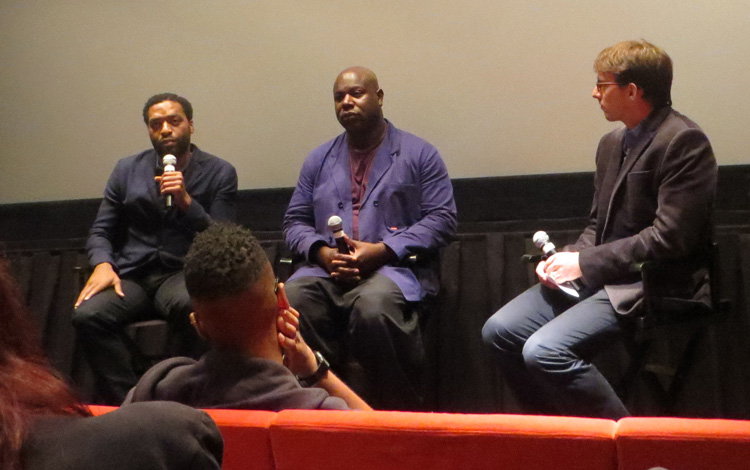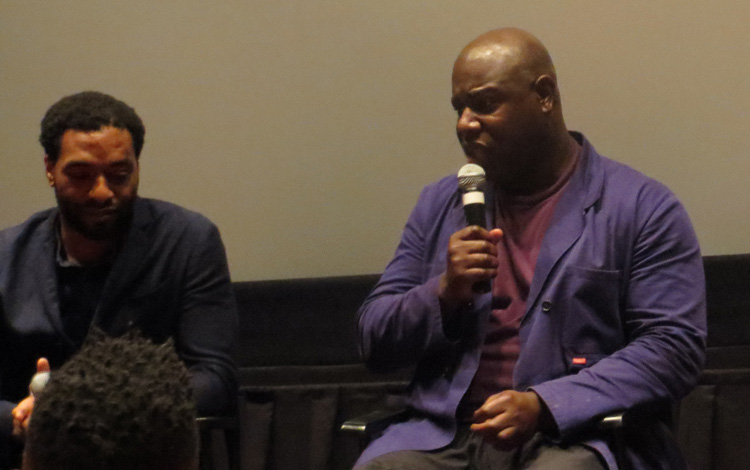The following questions and answers are excerpted from a conversation that followed the NBR screening of 12 Years A Slave.
Your character experiences some of the darkest things a person can experience. During your preparation and filming, was there anything in particular that helped you connect with him?
Ejiofor: While I was reading Solomon’s autobiography, I wanted to find out about who he was. I thought there was something about him that was too remarkable. I couldn’t let that slide and play something that was not specific. In the book, you recognize so many moments where you’re not necessarily going to make the same choices as him. There’s something in his attitude towards life and that’s why he’s able to survive this with his mind intact. He wrote a small part about being hung from that tree, and it’s blistering heat, 100 something degrees, and he’s hanging there for hours. He says in the book, I would’ve given more years of servitude if they had just moved me a few feet into the shade. And I thought, well this is the key to this guy, there is something about him that is completely unbreakable, there is something about his soul that is uncrushable in a certain way, and he can even articulate something like this so many years after he’s come out of the experience. I was aware in trying to find Solomon, he was always going to be the thing to hold onto during my search for this extraordinary man.
“There is hope in this film. This film for me is about love; it always has been and it always will be.”
The moments of change didn’t always coincide with the savagery. One of the most affecting scenes for me was the graveside song. You see this change that your character goes through and it’s a gentle scene. Can you talk about the role of violence and how it’s not always pinned to when your character changes?
Ejiofor: It’s interesting you mention that song because there were a few moments of real shift for Solomon. Obviously there’s violence because you have to see why someone’s psychology is adapting to the circumstance, especially that first beating with Burch in the dungeon, which is a moment of complete change. And then the tree, again, was another moment, a very different moment, but it helps you understand his will to survive. And then the graveside scene, which can be perceived as a gentle moment, but is also a very dynamic shift in psychology which is something I feel very strongly about in terms of his journey. Some people interpret his song as a kind of abandonment of hope, but I see it as him deciding it’s the only was he was going to survive. And it re-energizes him to survive and become part of that community. In that sense, there is something bittersweet about it. But again, it reflects a person who is going to do what it takes to keep himself and his mind alive.
Clearly, the scenes depicting Solomon’s horrendous experiences need to be shown. As a filmmaker, how did you calibrate the levels of violence?
McQueen: I made a movie about slavery and everyone seems to be embarrassed about it. I made a movie about Bobby Sands and a hunger strike, that story was covered after 27 years. I made a film about sex addiction, which no one wants to speak about. And now this is the other one, which is not my choice in a way. This is what happened. We’re either making a film about slavery or we’re not. I’m not going to apologize for the torture, the brutality, the cruelty that was done to African Americans in this country. That doesn’t mean people are guilty for it here, that’s what happened in the past. We had the recent situations with Trayvon Martin’s unfortunate killing, we have a black president, the 150th anniversary of the abolition of slavery, the Voting Rights Act being taken away, the 50th anniversary of the March on Washington. It’s a perfect storm for the conversation. The conversation cannot just be about the brutality. It should be about what happened and why it happened. So as far as balancing the situations of violence in the film, there has to be a situation where you’re telling the story, and it’s not just people being beaten, whipped, tortured both physically and psychologically. If you take the violence out of it, you don’t have a movie. Part of it is about the suppression of people. But also there’s hope in this film. This film for me is about love; it always has been and it always will be. Solomon finds a situation where he comes out of himself to join the congregation during the funeral. His heart swells with some kind of hope, more than hope. This is tradition. People have used religion to have some understanding and hope on the world. It’s such a complex question where the violence becomes so minute within the whole aspect of what we’re talking about here. This is what happened.
You’re so decisive as a filmmaker and that wide shot where Solomon was hanging from a tree with everything going on in the background was amazing. Do you get close-ups, coverage, or do you know what you want going in?
McQueen: No I don’t do coverage. I know. Why should I tax my artists and tax my crew for something that I won’t use? I know what I want. It’s pinpoint accuracy. I’ve worked with Sean Bobbitt for 13 years, who’s amazing, the DP. And we are absolutely precise in what we want and how we want to do it. I don’t do coverage; it’s a waste of time. You have to go in there with an idea – how are you going to portray this? How? So the hanging thing, from one shot we’ve got the people coming out of the cabins. What does that mean that not one of them cuts him down to help him? You start to understand the psychological significance and you start to understand that this is a common occurrence to some extent. You can’t touch him otherwise you’re going to get involved in it yourself. Yeah, I like directing.


